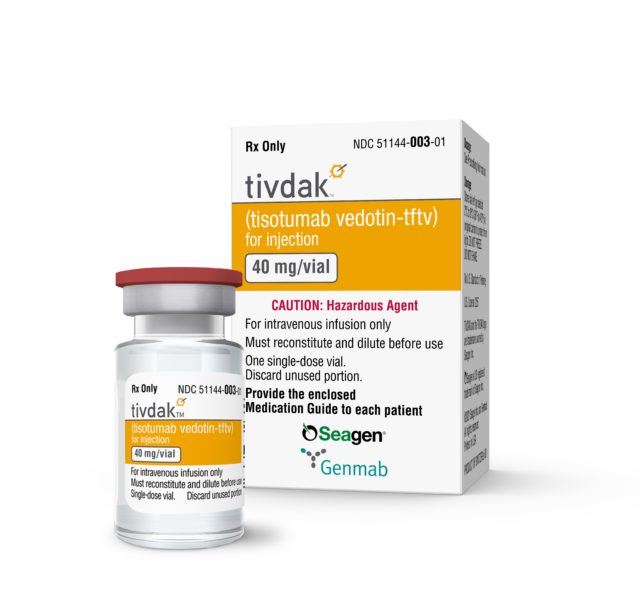
With an FDA nod in hand, Genmab and Seagen’s tisotumab vedotin-tftc is now the only approved antibody-drug conjugate (ADC) to treat adults with recurrent or metastatic cervical cancer. But the pair face an uphill battle with Merck’s heavyweight Keytruda, which is touting its own recent trial win in the front-line setting.
Federal regulators on Monday awarded tisotumab vedotin, now to be sold as Tivdak, an accelerated approval for patients whose disease progresses while on or after chemotherapy.
The companies will set Tivdak’s list price at $5,885 per 40mg single-dose vial, which will vary depending on a patient’s weight and treatment duration, a Seagen spokesperson said. That should equal out to $34,000 on average for a month’s worth of treatment in the U.S. before discounts and rebates are applied, the spokesperson added.
Tivdak’s win marks the first step in Genmab and Seagan’s plan to push its ADC through numerous cervical cancer settings, where treatments after first-line chemo are limited. The pair, which have agreed to split the profits equally, are testing Tivdak alongside several other drugs including Keytruda in an effort that could lead to blockbuster sales if successful, Evercore ISI has estimated.
The decision, based on Tivdak’s tumor response and durability data, comes after the agency granted the therapy an accelerated review in April and will be contingent upon confirmatory trials.
RELATED: ESMO: Seattle Genetics’ ADC candidate curbs hard-to-treat cervical cancer
Still, Tivdak will have to go head-to-head with Merck’s checkpoint inhibitor, approved for cervical cancer patients who have received chemotherapy and who test positive for PD-L1. At the time of its approval in 2018, Keytruda was given the go-ahead on the strength of just a 14% response rate.
Meanwhile, the FDA based its Tivdak decision on its key 101-person phase 2 trial, which found the drug shrank tumors in 24% of patients whose cancer had come back or spread after no more than two prior systemic regimens. Their response lasted a median of 8.3 months.
While that data pleased analysts, there was concern that adverse events could dampen the drug’s regulatory prospects. With today’s Tivdak approval, the FDA slapped it with a boxed warning for ocular side effects.
The Keytruda showdown could in fact get even harder now that Merck has fresh data showing its blockbuster PD-1 inhibitor extends patient’s lives in the front-line setting.
RELATED: ESMO: Merck details Keytruda’s ‘practice-changing’ cervical cancer survival win
In a phase 3 trial, Keytruda added to chemotherapy with or without Roche’s Avastin reduced the risk of death by 33% among patients with persistent, recurrent or metastatic cervical cancer who weren’t previously treated with systemic therapy, according to data presented at the European Society for Medical Oncology 2021 virtual congress over the weekend.
That also covered patients regardless of whether their tumors expressed PD-L1.






